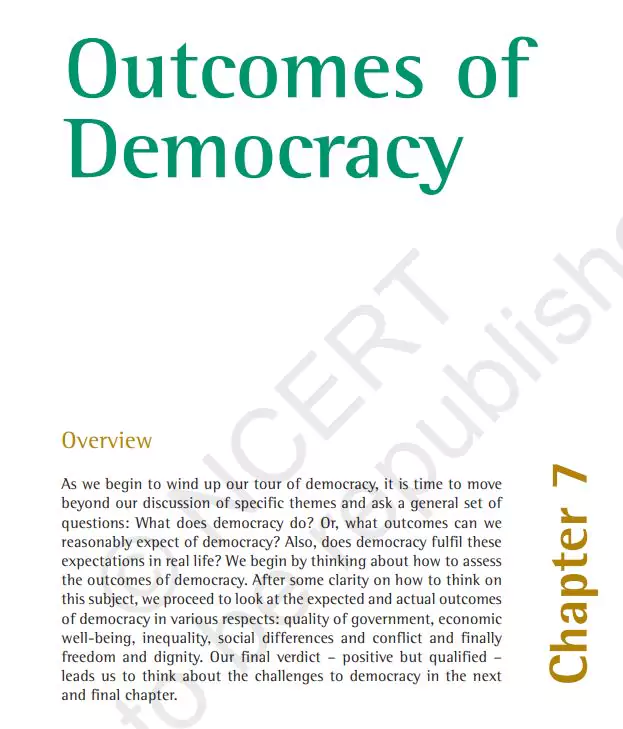‘NCERT Solutions for Class 10 Social Science Chapter 7 Outcomes of Democracy‘ PDF Quick download link is given at the bottom of this article. You can see the PDF demo, size of the PDF, page numbers, and direct download Free PDF of ‘Ncert Class 10 Social Science Chapter 7 Exercise Solution’ using the download button.
Outcomes of Democracy Book PDF Free Download

Chapter 7: Outcomes of Democracy
Are these expectations realised under democracies? When we talk to people around us, most of them support democracy against other alternatives, such as rule by a monarch or military or religious leaders. But not so many of them would be satisfied with the democracy in practice. So we face a dilemma: democracy is seen to be good in principle, but felt to be not so good in its practice.
This dilemma invites us to think hard about the outcomes of democracy. Do we prefer democracy only for moral reasons? Or are there some prudential reasons to support democracy too? Over a hundred countries of the world today claim and practice some kind of democratic politics: they have formal constitutions, they hold elections, they have parties and they guarantee rights of citizens.
While these features are common to most of them, these democracies are very much different from each other in terms of their social situations, their economic achievements and their cultures. Clearly, what may be achieved or not achieved under each of these democracies will be very different.
But is there something that we can expect from every democracy, just because it is democracy? Our interest in and fascination for democracy often pushes us into taking a position that democracy can address all socio-economic and political problems. If some of our expectations are not met, we start blaming the idea of democracy. Or, we start doubting if we are living in a democracy.
The first step towards thinking carefully about the outcomes of democracy is to recognise that democracy is just a form of government. It can only create conditions for achieving something. The citizens have to take advantage of those conditions and achieve those goals. Let us examine some of the things we can reasonably expect from democracy and examine the record of democracy.
There are some things that democracy must provide. In a democracy, we are most concerned with ensuring that people will have the right to choose their rulers and people will have control over the rulers. Whenever possible and necessary, citizens should be able to participate in decision making, that affects them all.
Therefore, the most basic outcome of democracy should be that it produces a government that is accountable to the citizens, and responsive to the needs and expectations of the citizens. Before we go into this question, we face another common question: Is the democratic government efficient? Is it effective? Some people think that democracy produces less effective government. It is, of course, true that non-democratic rulers do not have to bother about deliberation in assemblies or worry about majorities and public opinion.
So, they can be very quick and efficient in decision making and implementation. Democracy is based on the idea of deliberation and negotiation. So, some delay is bound to take place. Does that make democratic government inefficient? Let us think in terms of costs. Imagine a government that may take decisions very fast.
But it may take decisions that are not accepted by the people and may therefore face problems. In contrast, the democratic government will take more time to follow procedures before arriving at a decision. But because it has followed procedures, its decisions may be both more acceptable to the people and more effective. So, the cost of time that democracy pays is perhaps worth it
| Author | NCERT |
| Language | English |
| No. of Pages | 12 |
| PDF Size | 1.1 MB |
| Category | Social Science |
| Source/Credits | ncert.nic.in |
NCERT Solutions Class 11 Social Science Chapter 7 Outcomes of Democracy
1. How does democracy produce an accountable, responsive and legitimate government?
Answer.
The government can be accountable by framing and developing various laws and policies in which citizens can hold the government responsible if any of those policies and laws are not implemented or are held against the welfare of the citizens.
The government can be responsible when people start taking action when the government becomes insensitive about their aspirations. People can hold protests, carry out campaigns and organise rallies and force the government to respond to them. A democratic government is a legitimate government, as it is elected by citizens and enjoys the confidence and trust of the citizens.
2. What are the conditions under which democracies accommodate social diversities?
Answer.
Social diversities can be accommodated by focusing on all the communities of the society. The majority and minority communities should be given equal attention. Democracy is not the rule of the majority. In democratic countries, both the majority and minority work together to achieve progress and development of the nation. It is equally important to understand that the rule of the majority is not expressed in terms of religion or languages. Any person or group may become a majority in a democracy.
NCERT Class 11 Social Science Textbook Chapter 7 With Answer PDF Free Download
